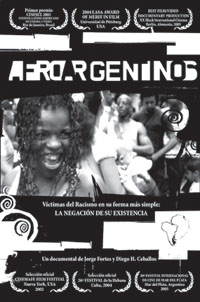• International Documentary Film Festival Tres Continentes, Buenos Aires, 2002
• Social Anthropology Film Showcase, La Plata, 2002
• International Documentary Showcase, Bogota, 2002
• Buenos Aires Negra Conference, 2002
• Ibero-American Film Schools Festival, Buenos Aires, 2002
• Danzario Americano Cultural Center, Buenos Aires, 2002
• UNCIPAR Film and Video Festival, 2002
• International Documentary Film Showcase, Cadiz, 2003
• Latin American Film and Video Festival, Buenos Aires, 2003
• Docupolis Showcase, 2003
• International Film and Video Showcase, Iquique, Chile, 2003
• CinemaFe Film Festival, New York, 2002
• African Diaspora Film Festival, New York, 2004
• Harlem Film Festival, New York, 2005
• Mar del Plata International Film Festival, 2005
• Zanzibar Film Festival, 2005
• Documenta Madrid, 2006
• Creatively Speaking, Brooklyn, 2011
• ASALH Conference Film Festival, 2017
• Association for the Study of African American Life and History, 2017
• Creatively Speaking Series, BAM, Brooklyn
